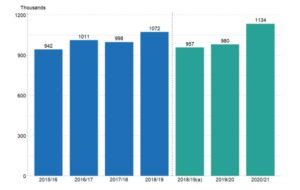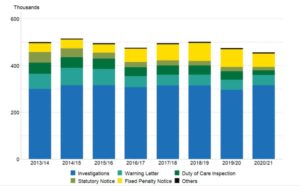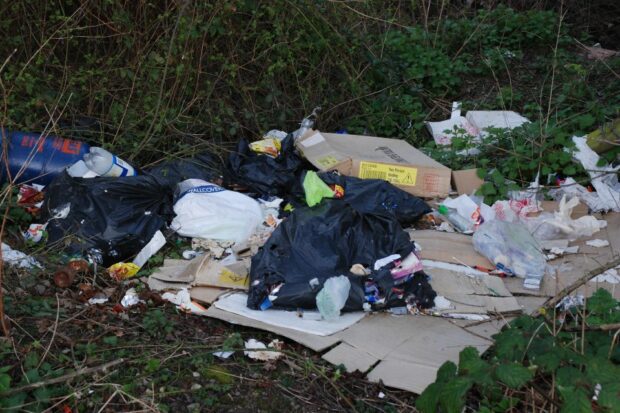The data, which is based on reported fly tipping incidents through the year, shows that local authorities dealt with 1.13 million incidents in 2020/21, while in 2019/20 the figure stood at 980,000.
Sixty five per cent (737,000) of reported fly-tips involved household waste, which is an increase of 16% from 635,000 incidents in 2019/20.
Defra put the increase in incidents down to the pandemic, noting that the first national lockdown 2020 led to some local authorities being unable to maintain collections of dry materials, with some suspending garden and bulky waste collections.
The department also highlighted changes in household consumption, travel and leisure patterns which also may have contributed to the increase in fly-tipping incidents reported for 2020/21.

Enforcement
Despite the rise in incidents, local authorities also carried out less enforcement actions for fly-tipping in 2020/21.
The total number of enforcement actions carried out in 2020/21 was 456,000, a 4% decrease from 2019/21.
The number of fixed penalty notices issued decreased by 24% in 2020/21, to 57,600 from 75,400 in 2019/20.
The number of court fines issued also decreased by 51% from 2,672 to 1,313 in 2020/21, with the value of total fines decreasing to £440,000. This was a decrease of 62% on the £1,170,000 total value of fines in 2019/20.

Area
Defra reported that the most common place for fly-tipping to occur was on highways, pavements and roads, which accounted for 43% of total incidents in 2020/21, the same as in 2019/20.
In 2020/21, the number of highway incidents was 485,000, which was an increase of 16% from 419,000 in 2019/20.
Size
The most common size category for fly-tipping incidents in 2020/21 was equivalent to a ‘small van load’, followed by the equivalent of a ‘car boot or less’.
In 2020/21, 39,000 or 4% of total incidents were of ‘tipper lorry load’ size or larger, which is an increase of 16% from 33,000 in 2019/20.
For large fly-tipping incidents, the cost of clearance to local authorities in England in 2020/21 was £11.6 million, compared with £10.9 million in 2019/20.
‘Blights communities’
Resources and Waste Minister Jo Churchill commented: “Fly-tipping is a crime which blights communities and poses a risk to human health and the environment. It also undermines legitimate waste businesses where unscrupulous operators undercut those acting within the law.
“During the pandemic, local authorities faced an unprecedented challenge to keep rubbish collections running and civic amenity sites open, and the Government worked closely with them to maintain these critical public services.
“We have already given local authorities a range of powers to tackle fly-tipping and we are going further; strengthening powers to detect and prosecute waste criminals through the new Environment Act, consulting on introducing electronic waste tracking and reforming the licencing system.”









Subscribe for free